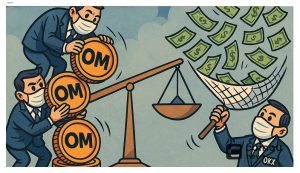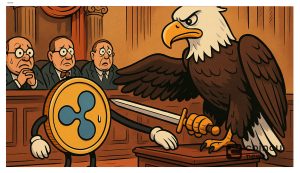Korean Banks Keep Exclusive Rights For Virtual Asset Real-name Verification Accounts
Key Points:
- Currently, only banks in Korea issue real-name verification accounts for virtual assets, but some argue that allowing securities companies to issue these accounts would break the oligopoly system of banks.
- The virtual asset industry is still being legislated in Korea, and the authorities are focusing on strict anti-money laundering and investor protection related to virtual assets, which they believe could be compromised by allowing securities companies to issue real-name accounts.
Financial authorities in Korea have decided against expanding the issuing institution of virtual asset real-name verification accounts, other than banks. The financial sector proposed a plan to allow securities companies to issue these accounts as a measure to break the oligopoly system of banks. However, the authorities have drawn a line, citing concerns around soundness, consumer protection, and financial stability.

The real-name confirmation deposit and withdrawal account system was introduced in Korea in 2017. Currently, only banks in Korea are issuing real-name verification accounts. In contrast, online securities companies such as Robinhood in the United States provide virtual asset trading services to customers through their own securities accounts.
The Financial Services Commission held the first meeting of the Working Group on Management, Business Practices and System Improvement to discuss bank reform issues. The meeting discussed a plan to allow securities companies to issue virtual asset real-name accounts, but the authorities ultimately concluded that additional expansion of real-name account issuing financial institutions is not desirable.
The authorities believe that institutions with sufficient financial capabilities need to take charge, as securities companies have relatively low anti-money laundering capabilities compared to banks. Various burdens may arise on financial companies that open accounts in the event of an insolvency or closure of an exchange.
Allowing securities companies to issue real-name accounts for virtual assets runs counter to the policy direction that focuses on strict anti-money laundering and investor protection related to virtual assets. As a result, there is a risk of an investment bubble.
Furthermore, the virtual asset industry is still in the process of being legislated, and the discussion or policy direction for the virtual asset industry is not yet mature.
Overall, the financial authorities in Korea have made it clear that they are prioritizing soundness, consumer protection, and financial stability over expanding the scope of business in the non-bank sector. As the virtual asset industry continues to evolve, it will be interesting to see how policies and regulations develop in the coming years.
DISCLAIMER: The Information on this website is provided as general market commentary and does not constitute investment advice. We encourage you to do your own research before investing.
Join us to keep track of news: https://linktr.ee/coincu
Thana
Coincu News























